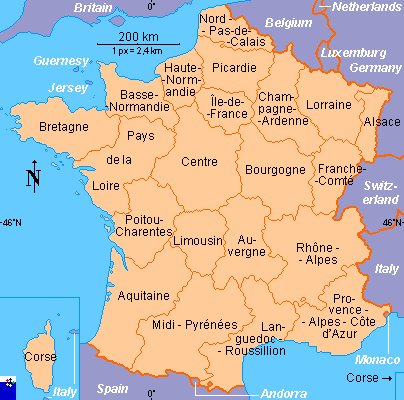(PT)
"A França, o maior país da UE em termos de território, estende-se do Mar do Norte ao Mediterrâneo. A sua paisagem diversificada caracteriza-se por regiões montanhosas a leste e a sul, incluindo o Monte Branco (4810 m) nos Alpes, que é o ponto mais alto da Europa Ocidental, e por extensas planícies atravessadas por quatro rios: o Sena, a norte, o Loire e o Garona, que correm para oeste, e o Ródano, que atravessa o lago de Genebra e desagua no Mar Mediterrâneo.
O Presidente da República desempenha um papel político importante, pois preside as reuniões do Conselho de Ministros e é o responsável máximo pela política externa e de defesa, cabendo ao Primeiro-Ministro a gestão corrente do país. O Presidente é eleito por sufrágio universal por um mandato de cinco anos. O Parlamento é composto pela Assembleia Nacional, cujos deputados são eleitos por sufrágio directo por cinco anos, e pelo Senado, cujos membros são designados por um colégio eleitoral."
Fonte: Europa.eu
Informações Gerais
Nome: França, República Francesa
Capital: Paris
Língua Oficial: Francês
Moeda: Euro
Governo: República Unitária Semipresencial
Individualidades
Chefe de Estado: Nicolas Sarkozy
Ministra de Estado, Negócios Estrangeiros e Assuntos Europeus: Alain Juppé
Presidência da República Francesa
 |
| www.elysee.fr |
Plano Geográfico/Social
Especificidades
"São franceses alguns dos mais influentes escritores e pensadores europeus, como Descartes e Pascal, do século XVII, Rousseau e Voltaire, do século XVIII, Balzac, Baudelaire e Flaubert, do século XIX, e Sartre e Camus, do século XX, bem como pintores mundialmente famosos, como Renoir, Monet, Cézanne, Gauguin, Matisse e Braque, para citar apenas alguns.
A cozinha francesa é das mais apreciadas na Europa, fazendo parte integrante da cultura e do estilo de vida franceses."
Fonte: Europa.eu
"Links" de interesse
(EN)
"France is the largest country in the EU, stretching from the North Sea to the Mediterranean. The landscape is diverse, with mountains in the east and south, including the Alpine peak of Mont Blanc (4 810 m) which is western Europe's highest point. Lowland France consists of four river basins, the Seine in the north, the Loire and the Garonne flowing westwards and the Rhône, which flows from Lake Geneva to the Mediterranean Sea.
The president of the Republic has an important political role. He chairs the meetings of the Council of Ministers (cabinet), and retains overall responsibility in key areas of foreign affairs and defence. The day-to-day running of the country is in the hands of the prime minister. The president is elected by direct popular vote for a period of five years. The parliament consists of a National Assembly, directly elected every five years, and a Senate whose members are chosen by an electoral college."
Source: Europa.eu
General Info
Name: France, French Republic
Capital: Paris
Official Language: French
Currency: Euro
Government: Unitary semi-presidential Republic
Important Persons
Chief of State: Nicolas Sarkozy
Minister of State, Foreign and European Affairs: Alain Juppé
Presidency of the Republic
 |
| www.elysee.fr |
Geographical/Social Plan
Interesting Facts
"France has an advanced industrial economy and an efficient farm sector. Main activities include automobile manufacture, aerospace, information technology, electronics, chemicals and pharmaceuticals and fashion.
France has produced some of the continent's most influential writers and thinkers from Descartes and Pascal in the 17th century, to Rousseau and Voltaire in the 18th, Balzac, Baudelaire and Flaubert in the 19th and Sartre and Camus in the 20th. In the last two centuries it has given the art world the works of Renoir, Monet, Cezanne, Gauguin, Matisse and Braque, to name but a few.
French cuisine is one of the finest in Europe; cooking and eating are part of French culture and lifestyle."
Fonte: Europa.eu
Saudações Protocolares,
Diogo Marques dos Santos



Nenhum comentário:
Postar um comentário